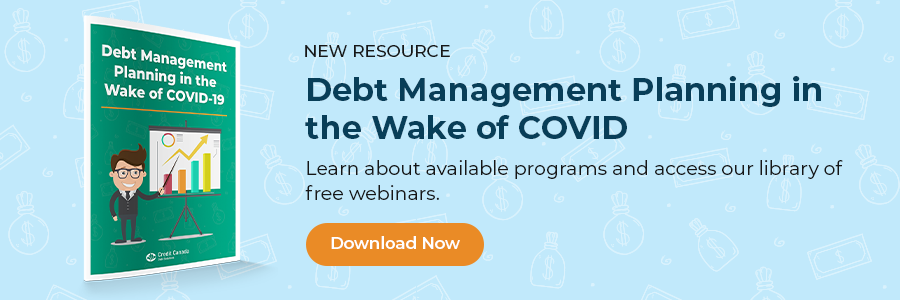
If you don’t like to use credit cards but hate carrying cash, or if you’re unable to obtain a credit card due to poor credit but still want to carry plastic, you have a couple of options: a prepaid credit card and a secured credit card. So how do these cards work, which ones help you build credit, and what are their advantages and disadvantages? We answer these questions and more!
Prepaid Credit Cards
Today there are more than 30 million active credit card accounts across Canada. Of course, credit cards aren’t for everyone. Many people don’t use them to avoid falling into debt, while others may hesitate to use their debit card to avoid the risk of overdrawing their account. Of course, carrying cash isn’t always convenient, and some retailers require a credit card for certain purchases. In this case, a prepaid credit card is a good option!
Is a prepaid card a credit card?
Prepaid credit cards look identical to credit cards, but they’re not a true credit card. This is because you’re not able to carry a credit balance and pay later with a prepaid card. Instead, you load your own money onto a prepaid credit card. This is why they’re sometimes called reloadable credit cards or pay-as-you-go credit cards.
How does a prepaid credit card work?
Prepaid cards can be purchased at retail locations, such as grocery stores and pharmacies, or from some banks and credit unions. You can also get a prepaid credit card online (you’ll receive the physical card in the mail). Once you have the card, you load it with your own money. Then, when you use the card, the dollar amount of your purchases gets deducted from the balance.
Once you’ve spent the total balance, the card will not work again until you reload it with more money.
How do you load money onto a prepaid credit card?
There are two ways to load money onto your prepaid credit card:
- Transferring money from your chequing or savings account onto the card
- Adding funds to the prepaid credit card at the location where you purchased it
Can I use a prepaid credit card to build credit?
The good news is that a poor credit score won’t affect your ability to get a prepaid credit card; after all, you’re using your own money to load it, not borrowing from a lender. However, because it’s not a credit card, it won’t help you establish a positive credit history or rebuild your credit. (A prepaid credit card doesn’t tell lenders anything about your borrowing or repayment habits, which is what they want to know before offering you credit.)
If you are looking to establish or rebuild your credit, you should look into a secured credit card.
What are some prepaid credit card benefits?
Prepaid credit cards are great for anyone who can’t get a credit card or secured credit card due to poor credit. However, they’re also used by people who simply want to manage their budget and don’t want to be indebted to a lender. Because you’re using your own money and can only spend up to what you’ve loaded onto the card, you never have to worry about spending beyond your budget, paying back interest fees, overdraft fees, or late charges.
A prepaid credit card can be a good tool for teaching teens about responsible money management; they’re also ideal for college and university students, as parents can reload the cards from their computer to help their kids pay for books, food, and other expenses.
What are the best prepaid credit cards?
There is no “best” prepaid credit card, but not all prepaid cards are created equally. You’ll want to look closely at the following before choosing your prepaid credit card and weigh the pros and cons of each:
- Monthly or annual fees (while minimal, some prepaid cards have them)
- Transaction and ATM fees
- Foreign exchange fees
- Rewards (generally .05%–1.5%, at select retailers)
- Welcome bonuses
- Direct deposit
- App option for checking the balance, etc.
Secured Credit Cards
A prepaid credit card is a good option for those who want to carry plastic but don’t want to be indebted to a lender. For those who want a more traditional credit card backed by a lender, but who may find it difficult to obtain one due to a poor credit history, a secured credit card is the way to go. Here’s what you need to know about getting a secured credit card in Canada.
What is a secured credit card?
A secured credit card is just like a regular credit card; it allows you to borrow against it and pay later. The only difference is that you must first make an initial deposit to protect the issuer, in case you fail to make payments. For this reason, they are sometimes called guaranteed credit cards.
How does a secured credit card work?
A secured credit card is issued by lenders. The initial deposit you make typically determines the amount of credit you will have available to you. So, say you put down a deposit of $500; the limit on the card will likely be $500. Want to increase your limit? You can usually add to your deposit later to boost your credit limit.
There are instances where your deposit doesn't necessarily determine your credit limit. So you could pay $99 as a security deposit on a secured credit card, but have a credit limit of $300. The caveat is that you'll likely need to have a fairly good credit history to obtain these types of secured credit cards.
It’s important to understand that your deposit won’t count towards payments. Instead, it acts as collateral in case you fail to make good on your payments. The deposit is refunded if and when you cancel the account, as long as your balance is paid in full.
After a period of time (generally one year) during which you’ve proven to the lender that you can make your monthly payments on time, the lender will switch you over to a traditional credit account with an unsecured credit card. At that point, your deposit will also be refunded or put towards your balance.
How can I get a secured credit card?
A secured credit card is issued by a lender, so you need to apply for it just as you would a traditional, unsecured credit card. Unlike a prepaid credit card, you can be denied a secured credit card. If your credit rating and/or credit history is poor (typically the reason why people apply for a secured credit card in the first place), your best bet for approval is through your own bank.
Can I use a secured credit card to build credit?
Secured credit cards are a great way to build or rebuild credit. Unlike prepaid credit cards, you are borrowing from a lender, so your payment activity will be reported on your credit report. If you use the card responsibly, this will be reflected on your credit report, improving your credit score over time. Once you’ve “graduated” to a traditional credit card, this will further boost your credit score.
What are some secured credit card benefits?
Here are the benefits of a secured credit card in a nutshell:
- It makes certain types of transactions possible
- If you’re not using credit or can’t obtain an unsecured credit card, you can still make transactions where only credit is accepted, such as renting a car or booking a hotel room
- You can often qualify to obtain one despite poor credit
- If used responsibly, it can help you establish your credit
- If used responsibly, it can help rebuild your credit
- In time, you can “graduate” to an unsecured credit card
- No one will know that it's a secured credit card versus a regular credit card
- It puts a cap on your spending
- Your deposit may earn (minimal) interest
What are the best secured credit cards?
Secured credit cards have a lot in common with unsecured credit cards, so you’ll want to look into the features of a number of them to determine which one is best for you. Factors to consider when choosing a secured credit card include:
- Annual fees
- Annual Percentage Rates (APRs)
- Transaction and ATM fees
- Foreign exchange fees
- Reward programs
- Welcome bonuses
Getting by Without Credit Cards
While it is possible to get by without credit cards, it’s becoming more and more challenging. Carrying cash can be a hassle (and thanks to COVID, some retailers won’t even accept cash anymore) and no one wants to write out cheques at the store these days.
However, traditional credit cards aren’t for everyone. You may know from past experience that credit cards can get you into a lot of financial trouble; or, perhaps you can’t get one due to bad credit. Using a prepaid credit card or a secured credit card allows you to keep your spending in check, and if you're using a secured credit card, it can also help you build your credit.
Contact Credit Canada if you're struggling with credit card debt
Are you struggling with money management and budgeting? Have you been denied an unsecured credit card? Contact the experts at Credit Canada for help and support. All of our counselling is free and completely confidential! You can book a free phone appointment today with one of our certified Credit Counsellors by calling 1.800.267.2272.
Frequently Asked Questions
Have a question? We are here to help.
What is a Debt Consolidation Program?
A Debt Consolidation Program (DCP) is an arrangement made between your creditors and a non-profit credit counselling agency. Working with a reputable, non-profit credit counselling agency means a certified Credit Counsellor will negotiate with your creditors on your behalf to drop the interest on your unsecured debts, while also rounding up all your unsecured debts into a single, lower monthly payment. In Canada’s provinces, such as Ontario, these debt payment programs lead to faster debt relief!
Can I enter a Debt Consolidation Program with bad credit?
Yes, you can sign up for a DCP even if you have bad credit. Your credit score will not impact your ability to get debt help through a DCP. Bad credit can, however, impact your ability to get a debt consolidation loan.
Do I have to give up my credit cards in a Debt Consolidation Program?
Will Debt Consolidation hurt my credit score?
Most people entering a DCP already have a low credit score. While a DCP could lower your credit score at first, in the long run, if you keep up with the program and make your monthly payments on time as agreed, your credit score will eventually improve.
Can you get out of a Debt Consolidation Program?
Anyone who signs up for a DCP must sign an agreement; however, it's completely voluntary and any time a client wants to leave the Program they can. Once a client has left the Program, they will have to deal with their creditors and collectors directly, and if their Counsellor negotiated interest relief and lower monthly payments, in most cases, these would no longer be an option for the client.








